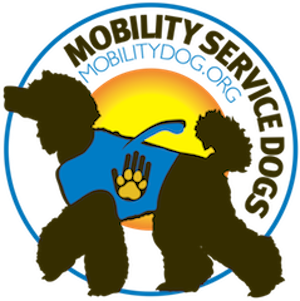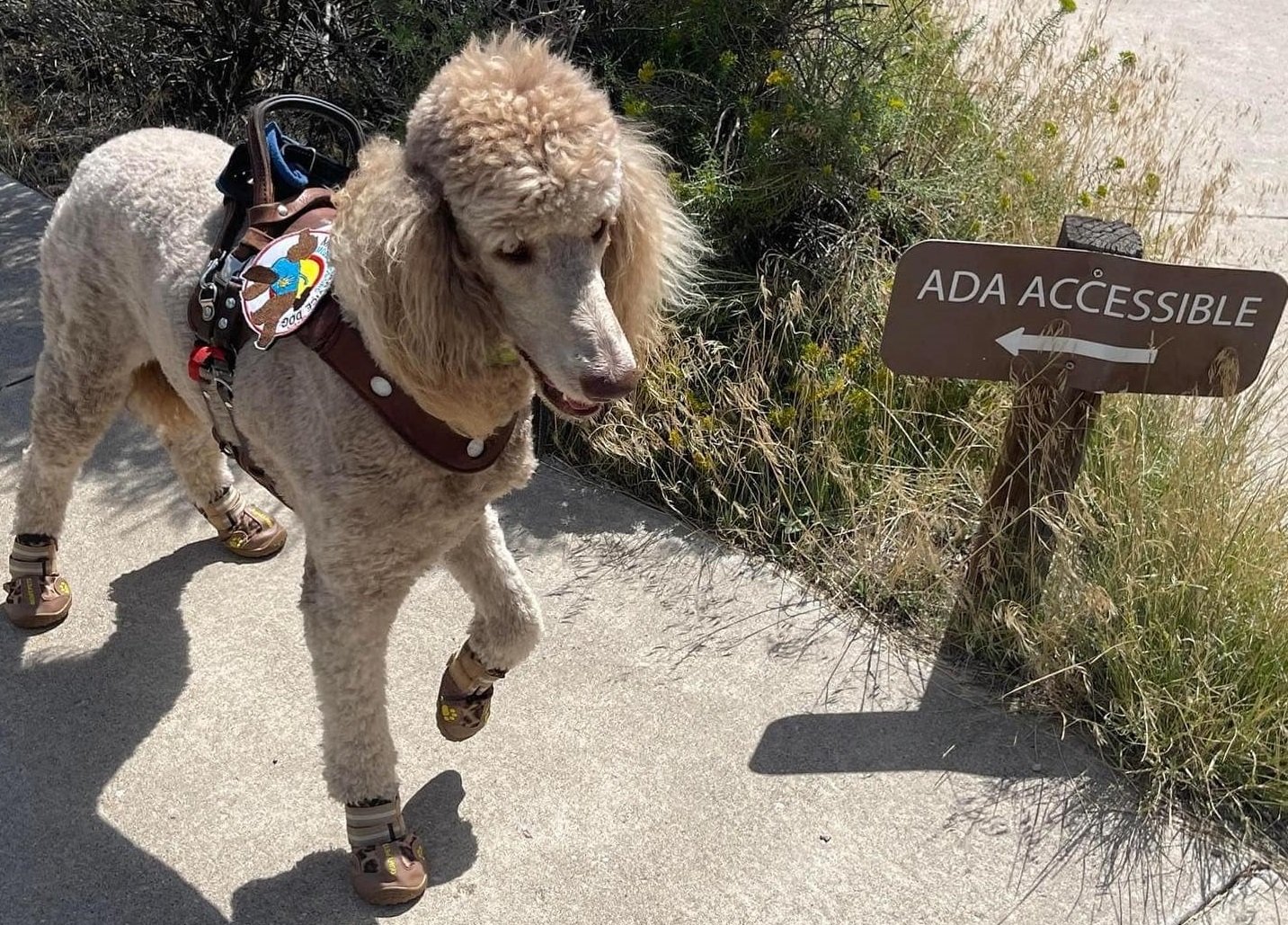Why do Dogs Hate Vacuums and Fireworks?
Brothers Lido and Nash, Future Mobility Service Dogs
Why do most dogs hate the vacuum cleaner? That’s an easy question: vacuums are big, loud and smelly! Its sounds may be both high-frequency (beyond human hearing) and low-frequency, seeming much noisier to your pooch than they do to you. Vacuum cleaners emit what scientists refer to as LFC sounds (low-frequency continuous). And even worse, the cacophony may last for a while, given all the dog hair you need to hoover up!
Vacuums Aren’t The Worst Noises for Dogs
As strong as dogs’ aversion to vacuum cleaners can sometimes be, they tend to respond even more strongly to high-frequency intermittent (HFI) sounds. A dog’s sensitivity to high-frequency sound is far greater than that of humans. Examples encompass such sporadic, unpredictable events as squeaky car brakes, fireworks, and gunfire.
White Poodle, Kevin, Sitting Among Fall Leaves on the Ground
Smoke detectors and smoke alarms are a particular concern for companion dogs. On the one hand, they are important safety devices in homes, required by building codes to be installed throughout the house. On the other hand, they are typically unpredictable and emit an uncomfortable sound that is difficult for the family dog to escape. Smoke alarms are designed to put forth a screech loud enough to wake a sleeping human with one ear embedded in a pillow and they work, as we have all experienced. If they are piercing and irritating to us, think how painfully loud they must be to our dogs.
Owners of noise-sensitive dogs are familiar with the ensuing behaviors:
Barking.
Howling.
Whining.
Pacing and hiding in the bathroom.
Underlying these behaviors is a set of physiological responses, including tachycardia (rapid heart rate), hypertension (elevated blood pressure), and increased secretion of epinephrine and norepinephrine (hormones associated with stress and fight-or-flight responses). The stress hormone cortisol may also rise rapidly.
How Do People Respond to Noise-Related Stress in their Dogs?
Not all that well, it seems. In one study, a team of researchers analyzed videos taken of dogs reacting to various noise stimuli. The most commonly observed reaction was what the researchers call “spectator.” The dog’s human simply watched the animal’s response without acting. The second most common reaction was “amusement” where the human found the dog’s stress response to be funny. In about a quarter of the videos, the person in the video antagonized the dog to elicit some additional reaction. Obvious concern for the dog’s well-being was expressed in less than one-fifth of the video examples.
What Can We Do in a World Full of Noise?
Mobility Service Dog on an ADA Accessible Trail
Below are some suggestions for specifically handling fireworks-related K9 fears. These may also be useful for other predictable loud noises.
Keep your dog away from loud noises. Keep your dog inside on the Fourth of July and New Year’s Eve if they tend to negatively react to fireworks. If you are able, go somewhere beyond your dog’s hearing range.
Create a quiet haven for your dog. Get your pet used to a calming environment beforehand. Dogs are den animals looking for a “cave” that feels safe. Try setting up an area in a quiet space away from windows – perhaps a basement or a large closet – so that she can’t hear or see fireworks. Use a crate if it’s where your dog feels safe.
Play white noise. Try leaving a fan, TV, or radio on to help mask the sounds of the fireworks.
Comfort your dog. If you can, stay home with your dog or leave her in the hands of a trusted person. But avoid seeming frantic or anxious. For example, rapidly saying, “It’s OK, it’s OK, it’s OK” in a higher-than-average pitch may convince your dog there is something to fear.
Go for a walk before the fireworks start. Exercise can help tire your dog enough to mitigate her reactions. If possible, choose a time and place that enables you to avoid the fireworks show.
Desensitize your pet to the sounds of fireworks. Try playing the sounds of fireworks (softly) so your dog becomes used to hearing them. Pair a video of the sounds of fireworks with your dog’s favorite treat your dog. This is called counter-conditioning.
Individual dogs vary in their ability to cope with stressors. Many remain completely calm in the presence of noise. Nevertheless, by one estimate, about half of dogs will display some level of noise sensitivity during their lives. As responsible humans, it’s our job to recognize the signs of sound-related stress and address the stimulus whenever possible.



